POLICE IN CHINA
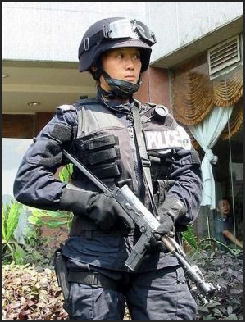
Elite member of the
Peoples Armed Police There are about 2 million police in China. Many of them operate out of small offices that serve communities of around 10,000 people. Typically police show up for work at 8:30 am and slide marker into a slot to show they are on duty and wait for local people to come by with complaints.
The police in China are generally poorly paid and ill trained. They are regarded with suspicion by ordinary Chinese, particularly in rural areas. Police have traditionally been more involved in maintaining government control than solving crimes. Family members of crime victims often become infuriated with police for their incompetence and unwillingness to make an effort to solve crimes that affect them.
Police have traditionally been tough and conspicuous. One Chinese school teacher told the New York Times, “You know in China the police are the most frightening thing.” Their impact is felt even when they are not around. A National Geographic photographer said, "But usually there's no need for lots of security. There' an implied authority in the air that make people behave."
Chinese police have a reputation for being corrupt. "In America," one Chinese man told the New York Times, "you know what's illegal. Your laws are clear. Not in China, the police they're the worst of them all. They're linked to the smugglers too. China is a crazy country now."
China only has extradition policies with 37 countries.
See Separate Articles DIFFERENT KINDS OF POLICE IN CHINA: CHENGGUAN, JIWEI AND AND PRETTY CITY WARDENS factsanddetails.com PROBLEMS WITH THE POLICE AND LAW ENFORCEMENT IN CHINA factsanddetails.com
History of the Police in China
The People's Armed Police Force (PAPF), after a trial period in selected jurisdictions, was officially established at the national level in 1983. In line with the general policy of reducing the size of the armed forces and transferring responsibilities to the civilian sector, the newly established force was formed from internal security units reassigned from the PLA to the Ministry of Public Security and from border defense (customs) and fire-fighting units (see Military Modernization , ch. 14). In 1985 the PAPF consisted of approximately 600,000 volunteers and conscripts. With a general headquarters at the national level and subordinate division-level provincial or specialized units, regimental-level detachments, and battalion-level brigades, it retained its military organization. [Source: Library of Congress]
“PAPF units assigned to internal security were responsible for guarding party and state organizations and foreign embassies and consulates, as well as for responding to emergencies and maintaining law and order. Border defense units performed standard customs duties, such as inspecting vehicles and ships entering and leaving the country, and maintained surveillance against smugglers and drug traffickers. PAPF firefighting units were responsible for fire-prevention education as well as for fighting fires. PAPF units at every level worked in close cooperation with the armed forces and other public security organizations.
Increased Spending on Police in China
Figures released in March 2011 show that the official domestic security budget has outstripped the military's for the first time. Spending on law and order will rise to 624.4bn yuan ($95 billion) in 2011, while the People's Liberation Army will receive 601.1bn yuan ($91.5 billion). China's total spending on domestic security was 514 billion yuan ($76.7 billion) in 2009, a whisker below the military budget of 532 billion yuan, a group of social researchers from the elite Tsinghua University in Beijing estimated in a report published earlier this year.
Nicholas Bequelin, a researcher on China for Human Rights Watch, an international watchdog group called the resources devoted to stability "absolutely humungous." "There's a vicious circle that more security leads to more security," he told Reuters. The amount of money spent on internal security “shows the rising costs of maintaining internal control ... This system is very sensitive to any instability or contention," Xie Yue, a political scientist at Tongji University in Shanghai who studies domestic security, told The Guardian.
High Cost of Increased Spending on Police in China
Chris Buckley of Reuters wrote: “The Chinese government's bid to maintain stability at all costs is creating a domestic security system so expensive that experts and officials say it is sapping funds needed elsewhere to sustain the country's economic health. "Threats to social stability are constantly being side-stepped and postponed, but that is making social breakdown increasingly grave," it said. "The current model of stability has reached the point where it cannot continue." [Source: Chris Buckley, Reuters, October 14, 2010]
“China swaddles all its big meetings, events and sensitive dates with police and guards to scare off trouble-makers, extinguish protests and project power. The massive security for the 2008 Olympics in Beijing has become a general template. On top of that the ruling Communist Party's smothering of public support for Nobel Peace Prize winner and jailed dissident, Liu Xiaobo, is the latest example of the lengths, and costs, the authorities are willing to go to keep a lid on even minor events that might seem to threaten its hold on power.”
“The show of strength works for now. But many question how much longer it can be effective. And for the moment, China's formula of one-party rule and economic growth can ward off serious challenges from below, the public still happy enough with its economic and social gains. Stuck to by successive leaders, that slogan has created an expensive illusion of solid order for which the country may one day pay heavily, the experts and officials said.” "This unyielding stability has already reached the point where it cannot be sustained, because it exacts a huge cost," Yu Jianrong, a prominent expert on social unrest at the Chinese Academy of Social Sciences, said in a recent lecture in Beijing. "What may happen in China in the future is that there are more outbreaks of local turmoil," he said.
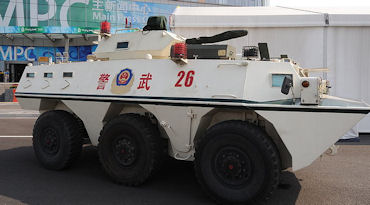
A study of 10 provinces and local governments showed outlays on domestic security rose faster than for schools, hospitals, and welfare, and often ate up a bigger share of budgets, the Social Sciences Weekly, a Shanghai paper, reported in May 2010. The focus on averting unrest is skewing officials' priorities, as well as budgets. Points systems are often used to weigh officials' promotion prospects based on the number of protests in their areas.
Some local governments demand grassroots officials deposit millions of yuan in "guarantees" every year, and money is taken from the fund if there are protests under their watch, a Chinese magazine, People's Tribune, reported in September 2010. "Many local government departments don't put themselves in the shoes of people in hardship and try to solve the fundamental problems at their root," Feng Qingyu, a professor at the Chinese Academy of Administration, which trains rising government officials, wrote in a study published in April. Rather, they worry about "how to increase and maintain security camera systems, how to increase uniformed police and plain clothes security staff," wrote Feng.
Police Duties in China
A policewoman in the industrial city of Baoding told the Times of London, “What really concerns people are matters that affect their daily lives, personal issues. Complaints are about their property, their security, family fights. Small things, but things that matter to them.”
The public security budget was raised by nearly a third in 2009 to $4.2 billion in part to address concerns about unrest in Tibet and western China and trouble brought about by unemployed workers and other problems associated with the economic crisis in 2008 and 2009.
In December 2008, China’s 2 million police were given the assignment to fan out across the nation and listen to complains by residents. The aim it seemed to make sure there were no disgruntled citizens around when China celebrate the 60th anniversary of Communist rule in October 2009.
In December 2009, a policeman that died after drinking too much at a banquet he was made to attend, was named a martyr who died in the line of duty. According to the China Daily, the traffic officer, Chen Lusheng of Shenzhen, passed out on a couch after a round of toasts and suffocated, Labeling him a martyr was apparently done so his family could claim compensation.
Police Investigations, Training and Equipment in China
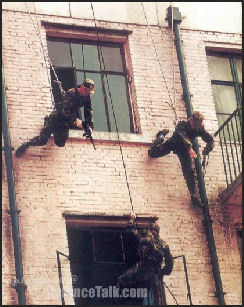
PAP training
Most police stations lack cars, even cameras, let alone advanced equipment such as computers, lie detectors and fingerprint sensors. In some places finger-cuffs are still used instead of handcuffs. Western-style, scientific investigations are rare. Most police forces lack the resources to carry out such inquiries. Farmers complain they must pay the police to get them to investigate murder cases.
Junior military police offices sometimes have their knees bound with tape to improve their posture. As part of their training, cadets in special anti-terrorist squads have a motorcycles driven over their chest. The secret to performing such feats is using 3,000-year-old martial arts breathing methods.
Chinese police are notorious for flouting the rules and arresting people planning to give testimonies the authorities don’t want to hear. They routinely use torture to extract confessions although, under Chinese law, confessions obtained through torture are supposed to be inadmissable in court. One bar owner who had frequent run ins with the police told the Washington Post, “I know in China, when they say no, it’s no. You never get a reason why.”
In the mid 2000s, the Chinese government said that it would start taping police interrogations to prevent forced confessions and the use of torture to extract confessions. The move was made after a highly publicized case involving a man that was imprisoned for murdering his wife for 11 years and was released after his wife turned up alive. The man had been tortured to extract the confession. After he was released a declaration of innocense from his arresting officer was found written in blood on a tombstone. The officer hung himself.
Film About Police Life in Northern China
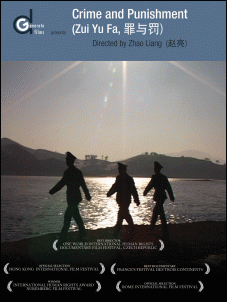
Crime and Punishment poster
Dan Edwards of dGenerate Films wrote: “Zhao’s film “Crime and Punishment” (Zui Yu Fa, 2007) provides an intimate snapshot of life inside a People’s Armed Police (PAP) station. Zhao told dGenerate Films he was only able to gain access to the station, located on the Chinese-Korean border in the remote northeast, because “these people are politically more naive and less politically savvy than their Beijing counterparts.” Zhao does not just exploit the officers’ naivety to expose their petty abuses of power however — the uniformed community provides a microcosm of the broader social structures informing the exercise of state power in contemporary China. [Source: Dan Edwards, dGenerate Films ]
“Crime and Punishment opens with the officers patiently folding their mattresses to form neat, identical piles on their beds. This extended sequence not only speaks of the conformist monotony of military life (the armed police are a paramilitary group organized similarly to the army), but also the thin line that separates those enforcing the law in China from those on the receiving end of the state’s coercive power. Like prisoners these men eat, work and sleep together in bare, whitewashed dormitories, kept at arm’s length from the townsfolk outside.”
“After this introductory sequence we follow the officers as they go about their duties, taking a call from a mentally disturbed man who claims he has found a body in his apartment, and raiding an illegal gambling den. After they arrest an alleged pickpocket in a market, we see the man questioned and casually beaten, first with kicks and punches, later with a leather strap. More surprising than the offhanded violence employed by the officers is their sheer incompetence. Although the film never spells out what differentiates the PAP from regular police, their military-style garb and an early scene in which a school principal praises their superior response time makes it clear this is an elite security unit. Despite their elevated status, as the film progresses it becomes embarrassingly evident these young men lack proper training or even an awareness of basic legalistic procedures.”
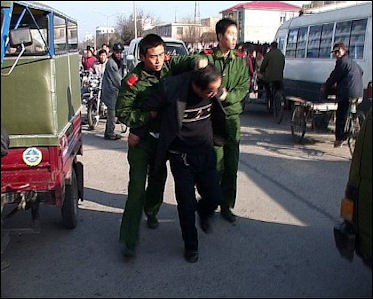
scene from
Crime and Punishment
“The alleged pickpocket, for example, is obviously unable to understand most of what is said to him, and his speech is largely unintelligible. After a comically inept “interrogation” the officers simply resort to beating him up. “Without a confession we can’t bring him to trial,” an exasperated
policeman explains to Zhao Liang as the suspect is dragged away. None of the police appear to register that the man is either deaf or mentally impaired, and hence incapable of responding to their questions. Eventually we hear one of the officers admit to his superior that they are unable to communicate with the suspect and have absolutely no evidence against him. He’s later released without charge.”
“Later we see the police bring in an elderly farmer caught collecting scrap without a permit, a classic example of the petty bureaucratic regulations that govern every aspect of life in China. The average person just ignores most of these rules most of the time, creating problems when the police decide to arbitrarily enforce them. The son’s farmer nicely sums up the attitude of many when the old man calls him from the station for assistance: “Fuck those fuckers!” the son explodes. “All they do is dick around” those motherfuckers!” Unfortunately for the old man, his son’s diatribe is loud enough for the officers to hear.” [Source: Dan Edwards, dGenerate Films ]
“After showing us the bumbling pettiness of much of the officers” work, Crime and Punishment takes a more challenging turn when a group of young farmers are caught with an illegal load of timber. After the farmers are subject to the seemingly de rigueur beatings, a pair of officers accompanies one of them back to his village to collect evidence and photograph the stumps of illegally logged trees.”
“In the village the officers are confronted by the man’s extended family living in a single cramped farmhouse. The suspect’s living conditions clearly touch a chord, and as they climb the hill behind the village to photograph the cut-down trees, a strange camaraderie develops between the farmer and police. “I barely made 4,000 yuan this year [less than USD 600],” the farmer explains. “I work hard all year round to send my kid to school and we’re still eating up the family savings. The house isn’t big enough — you saw it. My dad lives in that little lean-to. An old man shouldn’t have to live like that?” The officers make sympathetic noises and say they’ll ask their captain to minimize the man’s punishment.”
Crime and Punishment trailer
“Having established this link between the officers and the peasants they police, Zhao moves to the PAP’s annual “demobilization,” which sees many of the young recruits standing down after two years on the job. Only a handful continue to an academy where they are made into PAP officers, while the rest return to civilian life in the towns and villages they came from. One of the young recruits becomes drunk after being told he will be discharged, crying bitterly as he lays bare the corruption of the system: “If I had the 50,000 yuan to pay the bribe I know I’d get into the academy,” he says to his colleague. “History is written by the victors. If you lose you’re just a loser. But if you win, even if you win by bribes or dirty tricks, you’re the winner, you’re the man.”“
“Although the slim possibility of a lifetime of power and privilege is dangled in front of these young men, the majority are discarded by a system that perpetuates itself through an endless supply of eager recruits desperate to escape the impoverished conditions we’ve seen outside. There are no heroes or villains in this story, just young men caught up in a cycle that ultimately keeps most of them as powerless as the villagers they lord over.”
“From here Zhao cuts to the tethered dogs at the back of the station that we’ve seen fed throughout the film. As the smaller dog looks on, the larger animal is unceremoniously slaughtered with a knife to the heart. Only now does it become clear these animals are not guard dogs or even pets — they are raised by the police to be sacrificed for the pot. The scene is as unnerving as it is unexpected, and made all the more disturbing by the parallel with the young recruits’ fate.”
“His analogy complete, Zhao returns to the policemen’s mattresses folded in neat piles, now accompanied by the discarded insignia and caps of the demobilized recruits. As he rounds off the film’s neatly circular structure, Zhao leaves us with one final, tantalizingly open-ended image of peasants carrying household furniture across a snow-covered landscape. In the background a Christian Church dominates the scene — a sign of another power steadily growing in China’s countryside? A hint that farmers are increasingly turning to beliefs outside the morally bankrupt framework of the state? Zhao leaves us with a question rather than an answer, and an invitation to continue interrogating what we have seen after the end credits roll.”
High-Tech Police Equipment in China
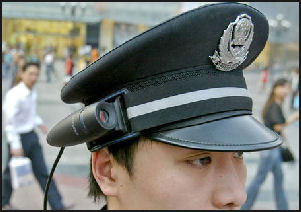
Police with portable camera
There is widespread use of surveillance cameras in China. At least 200,000 cameras monitor the citizens of Beijing and Shanghai. As of 2007, Shenzhen police had access to 20,000 police cameras and 180,000 indoor and outdoor closed-circuit television cameras owned by businesses and government agencies and linked into the police system. The police cameras are guided by a sophisticated computer system with software from an American company that can automatically recognize the faces of police supects and detect unusual activity. The number of cameras is expect to double in the next five years as smaller cities adopt similar systems
All police officers in Shenzhen carry satellite positioning equipment on their belts that allow their movements to be tracked on large resolution maps. When an office goes indoors and can not be monitored directly by satellite his location can be determined by tracking his cell phone. Chinese security agencies are working on a system that allows police to track individuals using their cell phones
As part of an operation called the Gold Shield Program, the Chinese government has collected digital data on 1.2 billion of China’s 1.3 billion people. Already there are concerns that corrupt officials have been selling the data to marketing companies. Recent divorcees say they get unsolicited calls from matchmakers. Other people complain they get calls from telemarketing companies that know the licence plate numbers of their cars and the birthdays of their children.
Identity Cards, See Bureaucracy and Ordinary Life, Local Government and Bureaucracy
More than 500 cities have established Internet police bureaus. See Internet.
Crime Fighting Efforts in China
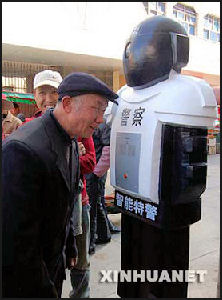
Police robot
Anti-crime campaigns have included parading criminals during public sentencing in stadiums in major cities such as Guangzhou
"Operation Strike Hard," launched in 1996, was a government crack down on corruption, organized crime, smuggling and other crimes. It led to 3,500 executions in 1996 alone. Among those put to death for corruption and Triad-connected crimes was the former governor of Guizhou.
In November 2006, the Chinese government announced that broken up more than 1,300 criminal gangs many of which had previously been protected Corrupt officials are believed to be the biggest obstacle to fighting organized crime in China.
Street vendors in Guangzhou do a brisk business selling switchblades, metal rods and other devises intended for protection. When the mayor there told police they needed to get tough on crime, using their weapons f necessary, the police responded by shooting fiver mugging suspects.
The relatively well-off town of Aodi in Zhejiang decided to built a “Great Wall’ around the town to keep thieves out. The wall is seven meters high and nearly a meter thick and is built in the style of the Great Wall with the exception if a swipe card system used to get through the double-doored gate. The 270 villagers were concerned about rising number of thefts of cell phones, computers and cash, and raised the $75,000 themselves need to build the wall. [Source: AFP]
Willy Lam wrote in China Brief, “the CCP administration is devoting more funds and resources to policing the Internet, which is seen as providing a free and fast platform for dissidents and liberal intellectuals to broadcast their political viewpoints. “Internet opinion is spontaneous, but [it] increasingly shows signs of becoming organized,” said a recent commentary by the party’s top theoretical journal Qiushi (‘seeking Truth’). “Unless administration is vigorous, criminal forces, hostile forces, terrorist organizations and others could manipulate public sentiment by manufacturing bogus opinion on the Internet, damaging social stability and national security?. Since the summer of 2011, Internet service providers have been asked to install more sophisticated software to police the information superhighway. As Beijing Party Secretary Liu Qi noted in a speech to the IT community in August 2011, Internet companies should “step up the application and management of new technology and absolutely put an end to fake and misleading information? [Source: Willy Lam, China Brief, Jamestown Foundation, vol. 11, no. 17, September 16, 2011]
Website Helps Single Policemen Find Partners
Mary Hennock wrote in The Guardian, “It is one of modern China's biggest social headaches: too many men, not enough women, and a surfeit of bachelors that some have estimated will top 30 million by the end of the decade. But now a Chinese police station in Chengdu is taking matters into its own hands, soliciting dates for single male officers through an official website entitled Save a Single Policeman. The station is concerned that its young officers, many of whom are newcomers to the Sichuan province, work long hours and have no family locally to help them find girlfriends. [Source: Mary Hennock, The Guardian, February 24, 2012]
The campaign has been led by Shi Yi, deputy director of Wuhou district police station in Chengdu, who runs the microblog website. "Police working hours are not stable, and they don't have much free time. They don't have time to look for a girlfriend," he told local media. Initially, Shi has put forward five hopefuls in their mid-to-late 20s, most of them from other provinces of China. The squad has notched up 38,771 followers in the first two weeks, though there is no information on the gender breakdown of their admirers. Female fans have turned up at the police station hoping to meet the officers.
The site shows glossy photos of each guy at work above a caption asking readers to "rescue" them. All have macho microblog names, such as Ice, Snake and Rocky Priest. Two from Wuhou's armed response unit are pictured toting guns. Each officer has his own Twitter-style Weibo account to chat with admirers. What goes on there is private, says Shi. "We don't control their personal life. How could you control their dates? It is their choice," he said. However, should any of his men get serious, "they should tell us once they have a girlfriend". Any marriages will be publicised, he promises.
Clean-cut officer Wang, aka Rocky Priest, is a traffic cop who presents himself as solid husband material, saying: "I can't change the world, but I can change the traffic on Third Ring Road." More romantically, his tweets hint at a broken heart: "Today is my first girlfriend's birthday. Although she is married, and we don't contact each other, I want to send her my best wishes. Thank you for your company during my younger years."
The 27-year-old from coastal Jiangsu province says he has been single for a year. He confesses to missing his parents, and hopes to find "an open-minded girl to marry". He has 10,443 followers. Wuhou is the first public security bureau branch to launch a microblog dating service. The attention has left Shi bashful about talking to the media. "I did not realise this event could gain so much attention. We just want to help them to find girlfriends," he said.
He shrugs off any fears his officers might abuse their fame. "Those five policeman are mature, stable and responsible guys. It is not possible they will become womanisers," he said. "They are already so busy with work. They won't have time to go out for many dates." If anything, he expects the avalanche of publicity to make them "more careful about their behaviour".
Image Sources: 1, 3) Defense Talk; 2) Cgstock http://www.cgstock.com/china ; 4) Weird News; 5) Blogcadre; 6) Julie Chao ; 7) Xinhua ; others Wikicommons ; deGenerate films
Text Sources: New York Times, Washington Post, Los Angeles Times, Times of London, National Geographic, The New Yorker, Time, Newsweek, Reuters, AP, Lonely Planet Guides, Compton’s Encyclopedia and various books and other publications.
Last updated November 2012

